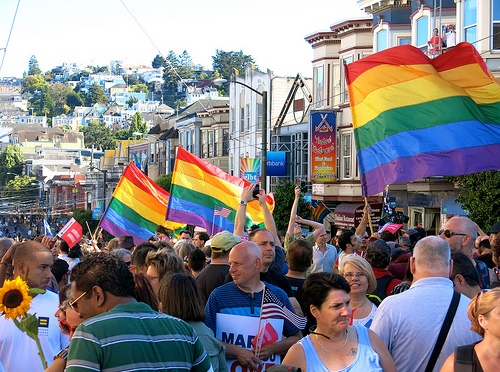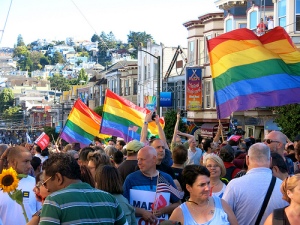I pitched the following to The Conversation some time ago, was rejected, and since then I’ve been trying to work out what to do with it. In light of their publication of Kevin Donnelly’s piece arguing against marriage equality, I thought it was time to publish it here as it addresses many of his arguments.
‘We can’t have same-sex marriage, because that’s just not what “marriage” really means.’
This has been a theme of some comments at The Conversation, whenever marriage equality is mentioned. (Update: it actually the entire theme of a recent article published there) On a different scale, but with similar intent, some governments have legislated to define marriage in a certain way – examples include the Marriage Legislation Amendment Bill 2004 here in Australia and the Defence of Marriage Act (Sept. 21, 1996) in the USA. I would argue that in both cases, appealing to the real meaning of a word is problematic.
Most people don’t spend a lot of time thinking about how or why particular words seem to have particular meanings. The idea that words should be used in some ways (and not others) is intuitively appealing. But on closer inspection, the idea that particular words mean, or refer to, particular things is sometimes quite tricky. In the case of marriage, it turns out to be particularly unhelpful.
In arguing that we should not enact same-sex marriage legislation because of the real meaning of marriage, the following question must be answered: Why do certain words mean certain things? There are, unsurprisingly, a number of theories. At the more radical end of the spectrum, Saul Kripke argued that there was no such thing as meaning anything by any word. I’m not going to go quite that far, not least because I think Kripke was wrong. It’s worth looking at how we might respond to scepticism about the existence of meaning as it highlights some of the difficulties in using the supposed ‘real’ meaning of marriage to justify denying same-sex couples the right to use that word.
So what is on the table in terms of backing up meaning?
‘Just look at the definition of the word’, some might say. Well, the definition of a word is what it is in virtue of the meaning of the word. If we can’t agree on the meaning, we won’t agree on the definition. On top of that, words are defined in terms of other words – words that we can also disagree about. So while we might start off arguing about the definition of ‘marriage’, we quickly move to disagreements over the meaning of ‘man’. Then we might quibble over the meaning of ‘male’. Every time you use a definition, I can claim that your interpretation of some word in that definition is flawed. If I were willing to extend my scepticism about the meanings of words far enough, there is no limit to how far this argument could go. What we need is an account of meaning that does not rely on our interpretations of other words.
We might look at the history of how a word has been used. So marriage would mean what it meant in the past, and should be used in accordance with how it has been used in the past. This might be tempting for those on the conservative side of this discussion. But if you acknowledge the fact that meanings change, you have to justify why the meaning of marriage should not change in this case. Also, how do you decide which bits of history to privilege? Do we include the history of other some cultures and not others?
Letting history go, some might appeal to the aggregate or majority view of how a whole group of people use a word right now, in the present. This might seem helpful, especially if the majority thinks as you do. But it is problematic nonetheless. If one person can be wrong about what a word means and how it should be applied, then it’s at least possible for a whole community to be similarly mistaken. A group of people thinking that something is true, and that thing actually being true are not necessarily the same thing. I’m not saying that it isn’t either, just that now you need an account of truth as well – we’ll leave that conversation for another day.
This brings us to what might be seen as a more metaphysically loaded theory. Why does marriage mean one man and one woman? Because the correct meaning of that word is ordained by God. This is an appealing solution for some people. However, I think there are two main problems.
The first is that not everyone believes in God, and if they don’t they are not going to accept this argument. Worse, about something like marriage, there is disagreement between different kinds of theists. Let me be very clear, this isn’t about atheists versus believers. Nor is it just about same-sex marriage. If two people both believe themselves to be Christians and they have a disagreement of the form: ‘It’s not really marriage if it wasn’t solemnised by a priest’ or ‘It’s not really marriage if the woman doesn’t submit to the man’, then deciding on what grounds we pick one view over the other is going to be complicated. Going down the road of arguing about which one of these people are ‘real’ Christians is unlikely to lead anywhere constructive. All that has happened is that an additional can of worms has been opened and people of other faiths (or no faith) are no closer to being convinced.
Even if we accepted that a particular God does exist, and that They do have a particular idea of what a word means, we have to be certain that we have correctly interpreted Their meaning. Some might argue that God puts the correct concept directly into our brains, thereby bypassing the problem of interpreting His meaning. But if this were the case, how could we ever make mistakes in how we used this word? I imagine that even very devout people occasionally make mistakes when using words like marriage. If this is true, then it counts as evidence against God putting the concept of marriage into our minds in some direct way. And if that’s true, we are interpreting His word, allowing room for potential error. Humans are finite and fallible. And while an omnipotent being (by definition) could surely imprint a word on our brains so thoroughly and perfectly that we never use it in error, I do not see any evidence that this actually happens.
In light of these difficulties, legislating to protect the real meaning of marriage is difficult. Some might claim that we cannot change how the word marriage is applied in real life, because that new application is supposedly out of line with the real meaning. But this can only be rationally defended to the extent that the account of what constitutes meaning actually works – otherwise your argument is a house built on sand. Clearly, I don’t have all (or any) of the answers. But I would encourage people, whether they are people of faith or not, to think carefully about what philosophical baggage they might need to unpack whenever they talk about the ‘real’ meaning of a word.
photo credit: torbakhopper celebrate good times!!! marriage equality : castro rally, san francisco (2013) via photopin (license)


